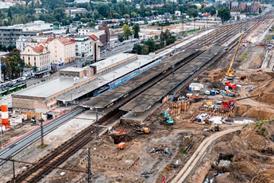UK: First North Western unveiled the first five of 27 Class 175 diesel multiple-units at its newly-built depot in Chester on February 4. Part of Alstom’s Coradia family, the trains will enter commercial service in May on routes from Birmingham and Chester to Holyhead and Manchester to Llandudno. Later they will take over FNW’s routes from Manchester to Blackpool, and services to Windermere and Barrow-in-Furness. This will allow the company to withdraw its last locomotive-hauled trains and to cascade Class 158 and Class 156 DMUs so that Class 142 railbuses can be taken out of use.
FNW’s Class 175 fleet comprises 11 two-car and 16 three-car sets. It is a steel-bodied design able to run at 160 km/h thanks to a 450hp Cummins engine mounted under each car. Some of the 27 sets were to have been fitted with more powerful engines to allow 200 km/h running, but FNW has abandoned this aspiration.
Alstom was required to keep the noise level in the saloon to 71dB at 160 km/h, but test measurements showed that 67dB had been achieved. This reflects use of a resilient floor, one of several interior design innovations that Alstom developed with Jones Garrard. This company also developed the cab exterior and was responsible for other work that included concept design and engineering design.
David Franks, Managing Director of FNW, said that the Class 175 trains were the ’first sign of £100m of investment’ in the company’s services. The fleet is costing £70m, and the Chester depot £18m.
Alstom has a contract to maintain the Class 175 fleet for 15 years, and initially it must have 24 of the trains available for service. Depot facilities include a fully-enclosed carriage washer supplied by Kärcher of Illingen near Stuttgart in Germany. This can function at -10°C.
Each unit is fitted with a nose-mounted video camera to record lineside events.
- Sister company First Great Western will shortly take delivery from Alstom of a fleet of 14 five-car Class 180 sets which have many common features with the Class 175. FNW and Alstom are awaiting approval from HM Railway Inspectorate for passengers to travel in the leading vehicle of a Class 180 at the maximum speed of 200 km/h. Measures designed to afford passengers protection in the event of a collision include sacrificing about 30% of the end cars to van space, use of crumple zones, and higher braking performance.
Class 175 suppliers
Main contractor Alstom
Diesel engines Cummins
Transmission and final drive Voith
Cooler group Covrad
Brakes Westinghouse
Air-conditioning Soprano
Doors Tebel Technologies
Seats Georg Eknes
Toilets Evac
Gangways Dowty Woodville
Air suspension Paulstra
Interior design Jones Garrard

















